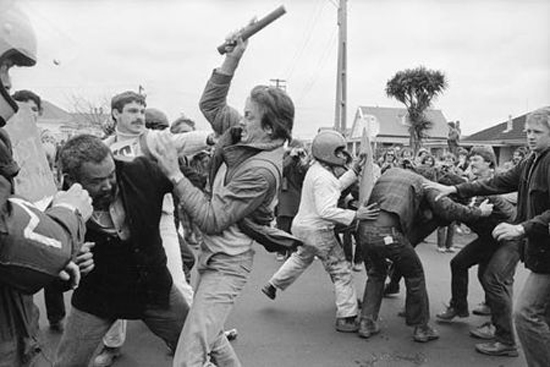
OPINION: Yet another anniversary of the 1981 Springbok tour is upon us and media coverage has been extensive but generally shallow. Most have taken a magazine-style approach with no shortage of dramatic pictures or film to illustrate – for example, see: Hamilton’s Rugby Park 1981 Springboks tour protest.
But Nikki Macdonald has an interesting piece using individuals to present the various views from the conflict (Waging war on and off the pitch) and the New Zealand Herald posed myself and red squad senior sergeant Ross Meurant as the protagonists as though this were a civil disturbance with the politicians and rugby union on the sidelines – see: Jared Savage and Andrew Stone’s The rugby tour that split us into two nations.
There were a few new revelations however. The Listener got access to police files from the tour and gave an interesting look at the issue from behind the police barricades (Redmer Yska: Inside the 1981 Springbok tour) and the aforementioned Ross Meurant gave an honest account of the lies he told to defend the police responsible for the infamous batoning of the clowns at the last game of the tour.
It’s nice to have one’s prejudices confirmed even if it takes 30 years.
What has emerged more strongly this time was the fact the tour had a much greater impact on South Africa than any of us appreciated at the time. Chris Laidlaw points this out (see Karl du Fresne’s 1981 and all that) as does Springbok captain Wynard Claassen (Team of ’81 coming ‘to reconcile’) and we will get more of this when the ’81 Boks come back for a reunion visit during the World Cup.
What’s missing is the most important story: the impact of the tour on New Zealand itself. At one level there is general feeling that the tour had an impact on our psyche and that we that we "grew up" as a country.
The provincial papers see this theme strongly with the Manawatu Evening Standard, for example, talking about a "cultural catharsis". See: Michael Cummings’ Manawatu Standard editorial Thirty years since our cultural catharsis.
Impact on race relations
However the bigger story – the impact of the tour on race issues here in New Zealand is no-where to be found. I think this was profound and deserves a good bit of journalistic attention. For example the tour protests and aftermath gave a solid boost to Maori nationalism, best illustrated in the new powers for the Waitangi Tribunal to look at historical Treaty grievances. These changes would have taken a lot longer to come about without the tour.
And what about the politicians who benefitted from the tour? Meurant and myself agree on the cynical use of the tour for political gain by National under Muldoon. Where are the National MPs who benefitted from the tour by winning Gisborne, Invercargill, New Plymouth and Taupo in the first-past-the-post election at the end of 1981? Those were the four crucial marginal seats won by National on the basis they wanted to keep politics out of sport. Yeah right.
It’s good to see some writing, in this case by John Edmundson, looking at a current issue that will develop in the same way as the fight against apartheid in South Africa. It’s the call for BDS (Boycott, Divestment and Sanctions) against Israeli apartheid (See: Thirty years on: The 1981 Springbok tour and protest today). In 30 years time it will be hard to find anyone who was not on the side of the Palestinians.
There are always some personal stories, which more than anything bring the past alive in the present. Here are a couple that caught my eye: 30th Anniversary of the Springbok Tour and Peter Clayworth’s Days of Shame or days of rage? A personal memoir of the ’81 tour.
There is plenty of scope for good journalism yet in this issue. It’s not too late for anyone out there in the media this time. Let’s not wait for the 50th anniversary…
Guest editorial in NZ Politics Daily on the Liberation blog. Republished with permission.



